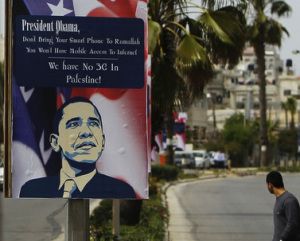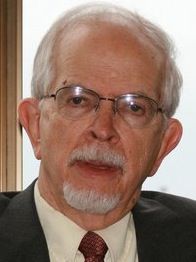
Publisher:
Bonnie King
CONTACT:
Newsroom@Salem-news.com
Advertising:
Adsales@Salem-news.com

~Truth~
~Justice~
~Peace~
TJP
Mar-21-2013 10:07

 TweetFollow @OregonNews
TweetFollow @OregonNews
'We Have No 3G in Palestine'
Dr. James M. Wall Salem-News.comTo Obama’s credit, he is trying. Maybe he feels he, too, is on a “mission from God”. And just maybe, he is right.
 Learn more, visit James Wall's Website, Wall Writings |
(CHICAGO) - Unless security forces have torn it down, the poster (shown here) was one of the sights President Obama would see if his motorcade made its way to Ramallah, Palestine on a West Bank highway.
The poster was posted on a corner after the road passes through the Qalandia checkpoint separating the West Bank from east Jerusalem.
Of course, the President would miss the poster and miss seeing the highway if he traveled to Ramallah in a helicopter. That would be unfortunate because he would miss seeing the poster which says in Arabic and English:
- “President Obama, don’t bring your smart phone to Ramallah. You won’t have mobile access to Internet — we have no 3G in Palestine!”
The poster would be one of more hospitable messages a disappointed Palestinian public would offer the visiting President on his visit to the West Bank this week.
Mahir Alawneh, a young Palestinian web consultant, designed, and placed a poster along the President’s route.
Alawneh told the Al Monitor web site he wanted to send a more gentle message to the American visitor.
It is well known that President Obama makes extensive use of his personal computer. The loss of a 3G connection should register on the President as a deprivation, albeit, one of the lesser items Israel withholds from the Palestinian population.
The largest Palestinian deprivation, of course, is the absence of freedom for a people living under occupation, an issue the President was not expected to address in any of his public utterances this week.
Mahir Alawneh understands this. In his Ramallah interview, Alawneh said: “Most of our people talk about the major issues, but not about our lifestyles.”
He added that “though 3G is a small issue for Palestinians, who have more pressing concerns, it serves as a point of comparison for Americans, who are likely to be very upset if it were suddenly banned in their country. So this is the point: If we don’t have this tiny thing, do you think we have the bigger things?”
An Israeli site explained the 3G problem:
- The banner with Obama’s picture is among many hung by activists, seeking to raise the American president’s awareness of the lack of 3G frequencies in the West Bank.
- Israeli authorities control cellular networks there and they have not granted Palestinian telecommunication companies 3G.
President Obama’s Middle East trip suggests nothing less than a man on a “hand-holding exercise” for Israelis, as one observer described the visit. It was also a journey that showed little concern or respect for a Palestinian people suffering under a military occupation which controls their every move, including their access to 3G.
If there is the slightest humane or moral value in this hand-holding exercise, it is hidden from the view of mere mortals. Behind this trip is a purely Zionist political agenda.
The trip is nothing less than a blatant political effort to persuade Israelis, especially young adults, that Barack Obama wants to be their friend.
Jonathan Cook, writing in CounterPunch, explains one political reason why restarting the peace process is not on Obama’s agenda this week.
- As [Prime Minister Benjamin] Netanyahu forms a new cabinet in his third term as prime minister, he has less control than he had in his previous governments.
- The settlers’ dedicated party, Jewish Home, has been awarded three key ministries – trade and industry, Jerusalem, and housing – as well as control of the parliamentary finance committee.
The new political control exercised by settlement leaders and their supporters, will ensure, Cook writes, that the settlements will flourish during this government’s term, not a recipe for peace with the Palestinians.
Which brings us to a work of popular film art that has the potential to throw some small amount of light, and perhaps a dollop of wisdom, on this complex problem.
As Obama prepares to return home, we might pause a moment to revisit the classic film, Blues Brothers, a 1980 picture directed by John Landis, which just happens to be set in Obama’s hometown of Chicago, Illinois.
The film opens with one brother, Jake, leaving prison. He and his brother Elwood, are reunited around their determination to save the Chicago parish orphanage where they lived as children.
They learn from the Mother Superior (still at the orphanage, and still wielding a ruler) that their old home will have to close unless the Mother Superior can come up with $5000.
The brothers are determined to solve this problem. How will they do it? They will take it one step at a time. First:
- Jake: We’re putting the band back together.
- Mr. Fabulous: Forget it. No way.
- Elwood: We’re on a mission from God.
Jake is John Belushi, right, in the picture shown below. Elwood is Dan Aykroyd, at left. They are the Blues brothers.
Their mission from God is to save the orphanage. The obstacles they face appear to be as insurmountable as the obstacles facing President Obama as he makes his first trip as president to Israel and Palestine.
 |
President Obama wants too solve what others see as an intractable problem. Like the Blues brothers, he will take it one step at a time:
First, he will put the US-Israel band “back together”.
Can he do that without alienating the Palestinians, the other party to this intractable problem? Only time will tell.
On this trip Obama is focused exclusively—with brief token stops in between—on Israel’s narrative.
He will visit the Dead Sea Scrolls, an artifact discovered in the West Bank, which Israel has moved to a museum in Israel to symbolize its “historic homeland”. Obama will also lay wreaths at the tombs of major Israeli leaders.
He will speak to college students, an audience that should be more receptive to his personal style and message, more receptive, that is, than established politicians in the Israeli Knesset.
In his effort to win the hearts and minds of Israel’s publics, and thus to shape future political decisions, Obama is burdened by his own set of obstacles, an implacable Zionist-purchased US Congress, a propagandized American public, and a newly-elected setter-dominated Israeli government.
President Obama also receives little support from a highly agitated progressive base now starting to think of him as Bush II. With friends like these, the impossible becomes even more difficult.
In the Blues Brothers movie, Jake and Elwood do eventually reach their impossible goal, as viewers discover at the film’s conclusion:
- Cook County Assessor’s Office Clerk: Can I help you?
- [the brothers back him up and lift him onto the counter]
- Jake: This is where they pay the taxes, right?
Cook County Assessor’s Office Clerk: Right.
- Elwood: This money is for the year’s assessment of Saint Helen of the Blessed Shroud Orphanage in Calumet City, Illinois.
- Jake: 5,000 bucks, it’s all there pal…
They earned the money honestly, signing a contract with a record promoter, achieving their impossible dream. And, as they saw it, succeeding on their “mission from God”.
Will Obama accomplish his goal of peace between Israel and Palestine? Will he be able to persuade an Israeli public (especially the younger citizens) that a war with Iran would be national suicide? And what chance does he have that the Palestinian public will understand that his one-sided trip schedule is finally in the best interest of peace?
On both counts, success seems not just evasive, but impossible.
To Obama’s credit, he is trying. Maybe he feels he, too, is on a “mission from God”. And just maybe, he is right.
As we await the final hours and aftermath of Obama’s trip, there is a rousing song from the Blues Brothers film, that offers a simple, yet profound non political solution to a complex problem.
During the excitement of the concert where they perform, the brothers escape the clutches of the Illinois state police, and make their way to the Cook County’s Assessor Office Clerk with a $5000 check, thus demonstrating the marriage of hope with pragmatism.
That ought to be a solution right out of Barack Obama’s political playbook. See and listen below:

Salem-News.com:
googlec507860f6901db00.html



Terms of Service | Privacy Policy
 Journalism was Jim Wall’s undergraduate college major at Emory University, Atlanta, Georgia. He has earned two MA degrees, one from Emory, and one from the University of Chicago, both in religion. An ordained United Methodist clergy person; he and his wife, Mary Eleanor, are the parents of three sons, and the grandparents of four grandchildren. They live in Elmhurst, Illinois.
Journalism was Jim Wall’s undergraduate college major at Emory University, Atlanta, Georgia. He has earned two MA degrees, one from Emory, and one from the University of Chicago, both in religion. An ordained United Methodist clergy person; he and his wife, Mary Eleanor, are the parents of three sons, and the grandparents of four grandchildren. They live in Elmhurst, Illinois.


All comments and messages are approved by people and self promotional links or unacceptable comments are denied.
[Return to Top]
©2025 Salem-News.com. All opinions expressed in this article are those of the author and do not necessarily reflect those of Salem-News.com.